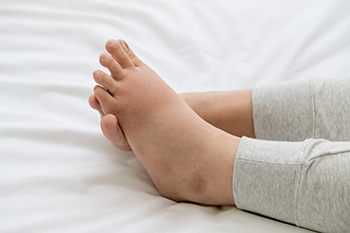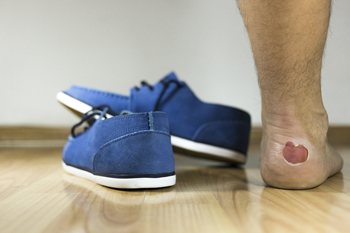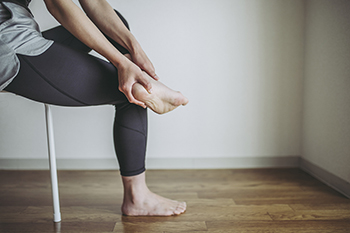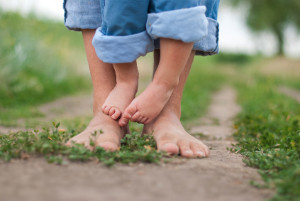Items filtered by date: September 2023
Causes and Relief Strategies for Swollen Feet

Swollen feet, a common issue that affects people of all ages, can be uncomfortable and concerning. To find relief, it is essential first to understand the underlying causes. One of the leading causes of swollen feet is fluid retention, often attributed to a sedentary lifestyle, excessive salt intake, or hormonal changes. Prolonged sitting or standing can also impede proper blood circulation, leading to swelling. Certain medical conditions, such as heart, kidney, or liver problems, can contribute to fluid buildup in the lower extremities. Another common factor is inflammation, which can result from injuries, infections, or chronic conditions such as arthritis. In some cases, medications or pregnancy may lead to incurring swollen feet. To relieve swollen feet, elevate your legs whenever possible, ideally above heart level, to encourage fluid drainage. Regular exercise, such as walking or ankle rotations, can help improve circulation. Reducing salt intake, wearing compression stockings, and staying hydrated are valuable preventive measures. If swelling persists or worsens, it is suggested that you consult a podiatrist to rule out any underlying medical conditions and explore additional treatment options.
Swollen feet can be a sign of an underlying condition. If you have any concerns, contact Priyanka Mude, DPM of North Canton Podiatry. Our doctor can provide the care you need to keep you pain-free and on your feet.
Swollen feet are a common ailment among pregnant women and people who stand or sit for extended periods. Aging may increase the possibility of swollen feet and patients who are obese often notice when their feet are swelling too. There may be medical reasons why swollen feet occur:
- Phlebitis - A condition that causes the veins to become inflamed and can also cause leg pain.
- Liver disease - This may lead to low blood levels of albumin which is a protein. This can cause fluid in the blood to pass into the tissues and several areas of the body can become swollen.
- Heart failure - When the heart doesn’t pump properly the blood that is normally pumped back to the heart can pool in the veins of the legs causing swollen feet.
- Kidney disease - One of the main functions of the kidneys is releasing excess fluid in the body. This type of condition can make it difficult for the kidneys to function properly, and as a result the feet may become swollen.
- Deep-vein thrombosis (DVT)- This is a serious condition where blood clots form in the veins of the legs. They can block the return of blood from the legs to the heart which may cause the feet to swell. It is important to be treated by a podiatrist if this condition is present.
Swollen feet can also be caused by bone and tendon conditions, including fractures, arthritis, and tendinitis. Additionally, there may be skin and toenail conditions and an infection may cause the feet to swell. Patients who take medicine to treat high blood pressure may be prone to getting swollen feet.
Many patients elevate their feet to help relieve the swelling and this is generally a temporary remedy. When a podiatrist is consulted the reason behind the swelling can be uncovered and subsequently treated.
If you have any questions please feel free to contact our office located in North Canton, Ohio . We offer the newest diagnostic tools and technology to treat your foot and ankle needs.
Are Bunions Affecting Your Everyday Life?
All About Foot Blisters

Blisters are fluid-filled pockets that typically form in the skin's upper layers after injury, commonly on feet. The fluid cushions the damaged area, aiding healing. Most blisters contain clear serum and heal naturally in three to seven days without medical intervention. Bursting them should be avoided to prevent infection or delays in healing. If they burst, allow drainage and cover with a sterile dressing. Blisters stem from various causes, including friction, heat, chemical contact, or medical conditions, like chickenpox. Preventing blisters involves wearing comfortable, well-fitting shoes, keeping feet dry with thicker socks or talcum powder, and applying sunscreen. If you have a foot blister that appears infected, is painful, or is recurring, it is suggested that you make an appointment with a podiatrist as soon as possible.
Blisters are prone to making everyday activities extremely uncomfortable. If your feet are hurting, contact Priyanka Mude, DPM of North Canton Podiatry. Our doctor can provide the care you need to keep you pain-free and on your feet.
Foot Blisters
Foot blisters develop as a result of constantly wearing tight or ill-fitting footwear. This happens due to the constant rubbing from the shoe, which can often lead to pain.
What Are Foot Blisters?
A foot blister is a small fluid-filled pocket that forms on the upper-most layer of the skin. Blisters are filled with clear fluid and can lead to blood drainage or pus if the area becomes infected.
How Do Blisters Form?
Blisters on the feet are often the result of constant friction of skin and material, usually by shoe rubbing. Walking in sandals, boots, or shoes that don’t fit properly for long periods of time can result in a blister. Having consistent foot moisture and humidity can easily lead to blister formation.
Prevention & Treatment
It is important to properly care for the affected area in order to prevent infection and ease the pain. Do not lance the blister and use a Band-Aid to provide pain relief. Also, be sure to keep your feet dry and wear proper fitting shoes. If you see blood or pus in a blister, seek assistance from a podiatrist.
If you have any questions, please feel free to contact our office located in North Canton, Ohio . We offer the newest diagnostic and treatment technologies for all your foot care needs.
Causes and Treatment for Heel Pain

Heel pain, a common ailment, can be a source of discomfort that interferes with daily activities. The causes of heel pain can vary, with one of the most prevalent being plantar fasciitis. This condition involves inflammation of the plantar fascia, the thick band of tissue that supports the arch of the foot. Other common culprits include Achilles tendonitis, heel spurs, and bursitis. The good news is that heel pain is often treatable. Treatment options for heel pain range from conservative methods to more advanced interventions. Resting and performing gentle stretching exercises can provide relief, while custom-made orthotics may help distribute pressure more evenly. In severe or persistent cases, minimally invasive procedures such as corticosteroid injections may be recommended. Consulting a podiatrist is crucial in determining the underlying cause, in addition to guiding you toward the most suitable treatment plan. By addressing the root cause and following a tailored treatment regimen, you can take significant steps towards a pain-free and active lifestyle. It is strongly suggested that you visit a podiatrist who can accurately diagnose the cause for your heel pain and treat it accordingly.
Many people suffer from bouts of heel pain. For more information, contact Priyanka Mude, DPM of North Canton Podiatry. Our doctor can provide the care you need to keep you pain-free and on your feet.
Causes of Heel Pain
Heel pain is often associated with plantar fasciitis. The plantar fascia is a band of tissues that extends along the bottom of the foot. A rip or tear in this ligament can cause inflammation of the tissue.
Achilles tendonitis is another cause of heel pain. Inflammation of the Achilles tendon will cause pain from fractures and muscle tearing. Lack of flexibility is also another symptom.
Heel spurs are another cause of pain. When the tissues of the plantar fascia undergo a great deal of stress, it can lead to ligament separation from the heel bone, causing heel spurs.
Why Might Heel Pain Occur?
- Wearing ill-fitting shoes
- Wearing non-supportive shoes
- Weight change
- Excessive running
Treatments
Heel pain should be treated as soon as possible for immediate results. Keeping your feet in a stress-free environment will help. If you suffer from Achilles tendonitis or plantar fasciitis, applying ice will reduce the swelling. Stretching before an exercise like running will help the muscles. Using all these tips will help make heel pain a condition of the past.
If you have any questions please contact our office located in North Canton, Ohio . We offer the newest diagnostic and treatment technologies for all your foot and ankle needs.
Navigating Children's Feet and Shoe Choices

Children's feet are on a fascinating journey of growth and development, and making proper shoe selection is a crucial aspect of their well-being. As children explore the world around them, their feet undergo rapid changes. It is essential to prioritize shoes that accommodate these transformations and support their healthy development. When purchasing shoes for children, it is beneficial to choose pairs that provide ample room for their growing toes. Look for shoes with a firm, yet flexible sole to aid proper movement. Breathable materials are a must to prevent sweat buildup and potential fungal infections. Getting regular measurements and fittings is vital, as children's feet can outgrow shoes surprisingly quickly. Investing in comfortable shoes that fit well ensures children can explore, play, and learn with ease while fostering optimal foot development. If you would like additional information about children’s feet and what type of shoes to purchase, it is suggested that you consult with a podiatrist who can provide you with the information you are seeking.
The health of a child’s feet is vital to their overall well-being. If you have any questions regarding foot health, contact Priyanka Mude, DPM of North Canton Podiatry. Our doctor can provide the care you need to keep you pain-free and on your feet.
Tips for Keeping Children's Feet Healthy
- Make sure their shoes fit properly
- Look for any signs of in-toeing or out-toeing
- Check to see if they have Clubfoot (condition that affects your child’s foot and ankle, twisting the heel and toes inward) which is one of the most common nonmajor birth defects.
- Lightly cover your baby’s feet (Tight covers may keep your baby from moving their feet freely, and could prevent normal development)
- Allow your toddler to go shoeless (Shoes can be restricting for a young child’s foot)
- Cut toenails straight across to avoid ingrown toenails
- Keep your child’s foot clean and dry
- Cover cuts and scrapes. Wash any scratches with soap and water and cover them with a bandage until they’ve healed.
If you have any questions, please feel free to contact our office located in North Canton, Ohio . We offer the newest diagnostic and treatment technologies for all your foot care needs.

